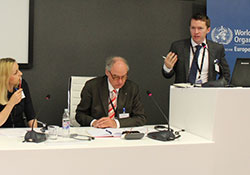Policy conference on innovating public health finance in Bosnia and Herzegovina

WHO
WHO/Europe is working to identify challenges, opportunities and options for sustaining and improving financial investment in public health services throughout Bosnia and Herzegovina. On 26–27 May 2015, a conference centred on a joint project for developing and advancing modern and sustainable public health strategies, capacities and services to improve population health took place in Bosnia and Herzegovina.
Developed and financially supported by WHO/Europe in partnership with the Swiss Agency for Development and Cooperation, the project aims to:
- support health authorities in Bosnia and Herzegovina in developing new and updating existing public health policies;
- identify options for strengthening public health services and capacities;
- contribute to improved prevention and control of major noncommunicable diseases, in particular cardiovascular risks; and
- address population and individual health care services.
The two-day national conference was organized by WHO and the European Observatory on Health Systems and Policies with international and subregional representation. It brought together policy-makers from health and other sectors in Bosnia and Herzegovina and neighbouring countries with similar public health heritage and experience.
In the opening session, Dr Boris Rebac from the WHO Country Office, Bosnia and Herzegovina illustrated "the importance of a strong public health vision and common goals and objectives" especially in a country in which key decisions are made at various levels.
WHO consultant, Professor Helmut Brand, from Maastricht University, the Netherlands expressed the importance of perseverance and continuity when developing strategies for improving Bosnia and Herzegovina's health saying, "Public health is not a sprint; it is a marathon."
The conference served as a platform to present and discuss recent evidence, and identify challenges and opportunities in investing in public health by:
- exchanging ideas on how best to obtain, sustain and increase funding for public health;
- taking into account the implications of the economic crisis and the risks of austerity policies;
- paying particular attention to aligning innovations and ideas with the values, principles and objectives of Health 2020 and the accompanying "European action plan for strengthening public health capacities and services";
- addressing how to increase value from public health investments; and
- reviewing innovative models in reorganizing and financing public health services.
Representing the national institute of public health of Slovenia, Professor Ivan Erzen shared the importance of aligning public health institutions to common goals, explaining that in Slovenia, "the alignment of regional public health institutes with the national public health organization enabled us to be more confident vis-a-vis the dialogue with other sectors." He concluded that within this effort, it is "important to speak with one voice in public health."



